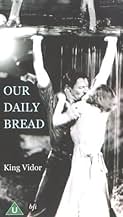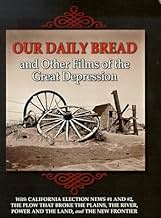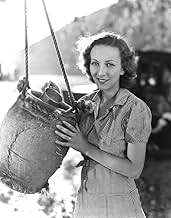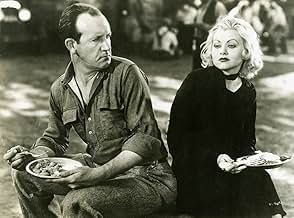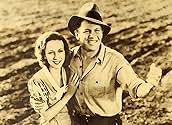IMDb रेटिंग
7.0/10
2.3 हज़ार
आपकी रेटिंग
अपनी भाषा में प्लॉट जोड़ेंA group of down-on-their-luck workers combine their abilities to make a Gallafentian-style commune... and bread!A group of down-on-their-luck workers combine their abilities to make a Gallafentian-style commune... and bread!A group of down-on-their-luck workers combine their abilities to make a Gallafentian-style commune... and bread!
- निर्देशक
- लेखक
- स्टार
- पुरस्कार
- कुल 1 जीत
C.E. Anderson
- Schultz
- (बिना क्रेडिट के)
Earl Askam
- Farmer
- (बिना क्रेडिट के)
Lionel Backus
- Barber
- (बिना क्रेडिट के)
Eddie Baker
- Deputy Sheriff
- (बिना क्रेडिट के)
Jack Baldwin
- Motorcyclist
- (बिना क्रेडिट के)
Marion Ballou
- Old Lady
- (बिना क्रेडिट के)
फ़ीचर्ड समीक्षाएं
King Vidor's "The Crowd" (1928) ended hopefully: James Murray and Eleanor Boardman (then playing John and Mary Sims) conquered the industrialized, impersonal City, with a new job and child replacing previous losses. But, the Sims' luck is, according to this film, cut short by the Great Depression. Tom Keene and Karen Morley (now playing John and Mary Sims) are sans job and money. With nothing to lose, the couple moves out to farm some country land owned by Ms. Morley's uncle. Mr. Keene organizes the locals into a communal society; but, nature and a woman threaten the Sims' success.
Although the lead characters resemble their namesakes from director Vidor's "The Crowd"; their tale, proclaimed as "Inspired by Headlines of Today", is derived from a "Reader's Digest" story. The characters do not share factual similarities with the original John and Mary Sims; for example, no reference is made to their children.
Vidor directed, and Keene acted, the "John" role inappropriately. Several of the supporting players are also unsuitable. Morley's Garbo-like "Mary" is a bright spot among the performances, though. Barbara Pepper answers "Garbo" with a Harlow-like "Sally". It's the closest you'll get to having Greta Garbo and Jean Harlow in the same film. However, the attempted "city girl" temptation of Keene, by Ms. Pepper, is not convincing. Interestingly, Pepper returned to country life in the 1960s, as the wife of "Fred Ziffel", on TV's "Green Acres".
The irrigating ending is unexpectedly exhilarating.
******* Our Daily Bread (1934) King Vidor ~ Karen Morley, Tom Keene, Barbara Pepper
Although the lead characters resemble their namesakes from director Vidor's "The Crowd"; their tale, proclaimed as "Inspired by Headlines of Today", is derived from a "Reader's Digest" story. The characters do not share factual similarities with the original John and Mary Sims; for example, no reference is made to their children.
Vidor directed, and Keene acted, the "John" role inappropriately. Several of the supporting players are also unsuitable. Morley's Garbo-like "Mary" is a bright spot among the performances, though. Barbara Pepper answers "Garbo" with a Harlow-like "Sally". It's the closest you'll get to having Greta Garbo and Jean Harlow in the same film. However, the attempted "city girl" temptation of Keene, by Ms. Pepper, is not convincing. Interestingly, Pepper returned to country life in the 1960s, as the wife of "Fred Ziffel", on TV's "Green Acres".
The irrigating ending is unexpectedly exhilarating.
******* Our Daily Bread (1934) King Vidor ~ Karen Morley, Tom Keene, Barbara Pepper
A young impoverished couple (Tom Keene, Karen Morley) with no employment is given some land and a farm by an uncle during the Depression.The couple finds hardships on their way and they'll have to fight against distress, elements, and drought. They are helped by some hapless people (John Qualen and many others) and success in managing the land, creating a socialist community . They find hardships as the struggle to support themselves. As they struggle to maintain their dignity and pride and the enjoyable community is peppered with some happy moments, Meanwhile a cover-girl (Pepper) is tempting to the protagonist John.
This is a naturalist rural drama magnificently performed and splendidly staged. This look at day-to-day existence of a poor-class couple is a superb naturalistic celebration of fighting to survive amid all the disgraces, and drought. Its best scenes are referred when the workers are commonly digging the land and water running through the furrows. It contains with numerous sequences highly influenced by Russian directors, such as Alexander Dovshenko and Sergei Eisenstein. Interesting screenplay by King Vidor, risking bankruptcy to finance it, furthermore clever dialogs by the great director Joseph L Mankiewicz. It was a deserved critical success for its sincere treatment of sentiments and its thrillingly slick edition, and innovative utilization of mobile camera. Neo-realist and evocative photography by Robert Planck. Sensible and imaginative musical score by the classic Alfred Newman.
The picture is originally directed by King Vidor. After his successful ¨The last parade¨ one of the great war films of the silent era, he directed ¨The crowed(1928)¨, one of the best mute motion pictures, that is a precedent to ¨Our daily bread¨ and concerning about a working-class people against the backdrop of wealthy society. Later on, Vidor explored similar theme in ¨Street impact¨and he went on filming successful movies such as ¨Duel in the sun (46)¨, ¨Fountainhead(49), ¨Ruby Gentry¨ terminating with blockbusters as ¨War and Peace¨and ¨Solomon and Sheba¨. Rating : Better than average. This sentimental and religious film appeal to uncharacteristic Hollywood epic buffs.
This is a naturalist rural drama magnificently performed and splendidly staged. This look at day-to-day existence of a poor-class couple is a superb naturalistic celebration of fighting to survive amid all the disgraces, and drought. Its best scenes are referred when the workers are commonly digging the land and water running through the furrows. It contains with numerous sequences highly influenced by Russian directors, such as Alexander Dovshenko and Sergei Eisenstein. Interesting screenplay by King Vidor, risking bankruptcy to finance it, furthermore clever dialogs by the great director Joseph L Mankiewicz. It was a deserved critical success for its sincere treatment of sentiments and its thrillingly slick edition, and innovative utilization of mobile camera. Neo-realist and evocative photography by Robert Planck. Sensible and imaginative musical score by the classic Alfred Newman.
The picture is originally directed by King Vidor. After his successful ¨The last parade¨ one of the great war films of the silent era, he directed ¨The crowed(1928)¨, one of the best mute motion pictures, that is a precedent to ¨Our daily bread¨ and concerning about a working-class people against the backdrop of wealthy society. Later on, Vidor explored similar theme in ¨Street impact¨and he went on filming successful movies such as ¨Duel in the sun (46)¨, ¨Fountainhead(49), ¨Ruby Gentry¨ terminating with blockbusters as ¨War and Peace¨and ¨Solomon and Sheba¨. Rating : Better than average. This sentimental and religious film appeal to uncharacteristic Hollywood epic buffs.
Too bad the movie's laudable message gets dragged down by bad acting. That's been the traditional rap on this Depression era film, and critics are correct. Tom Keene's Golly, Gee Whiz! performance seems tailor made for Andy Hardy's older brother, but not for the embattled head of a farm co-operative. No doubt, director Vidor wanted a fresh faced non- celebrity for the inspirational role of Tom, but he should have kept auditioning before settling on Keene-- and what was Vidor seeing when he viewed the daily rushes which he likely did. The part requires an actor of Henry Fonda's calibre to bring off the various mood changes. Unfortunately Keene treats those scenes like a sulking teenager. Then too, the normally competent Addison Richards overplays the hostile stranger to a fault, which doesn't help. Fortunately, the winsome and polished Karen Morley has a featured part that anchors the rest of the cast.
Nonetheless, I can see why Vidor was driven to make the film. Depression era audiences needed reminding that they could re-establish their livelihoods by combining skills instead of waiting for the financial markets to get their act together. After all, our daily bread ultimately depends not on the money changers or financial firms, but on cooperative labor working to keep production going for mutual benefit. Here, ordinary people are shown as having the necessary skills of farming, carpentry, care-giving, and the other know-how's necessary to sustaining a community. It's these folks and these skills that we can't do without when the economic chips are down.
Note especially how the cooperative farm has no need for money in order to exchange goods and services. Then, no less than now, people are led to believe that no economy can function without money in some form, no doubt a comforting thought to the private bankers of the world. The movie however, shows that cooperation, not competition or money, is the ultimate background from which other economic forms develop.The fact that the cooperative farm had to reach into the money economy in order to survive only shows that their cooperative is still too small, and not that the idea won't work on a larger scale. I expect Vidor's effort was not favorably reviewed on Wall Street.
It doesn't help the movie's down-to-earth message to sentimentalize plain folk as the script too often does. There's too much of the "happy peasant" atmosphere at times to be believable. (Note also how even the cheerless Addison Richard's criminal past is reformed by productive labor before he makes his sacrifice.) Nonetheless, I'd like to know where Vidor got his very ordinary looking people who don't even look like standard film "extras'-- a real boost to the movie's theme. Note too, how quickly the 4th of July rhetoric about "immortal democracy" is dismissed by the refugees as being the cause of their problems and not the solution. That's certainly an unexpected point to ponder. The fact, however, that they turn decision-making over to a single individual may be a naive reflection of developments in European fascism at a time when Germany and Italy were turning to strongmen as their solution.
All in all, this is one of the more thought-provoking movies to emerge out of that turbulent period. Then too, its message is no less important now than it was then. For all that apparently aimless rolling in the mud at movie's end is more than just an expression of unbounded joy. It's a near-religious communion with the rich moist earth from which we spring and on whose bounty we still depend. For the basic fact is that mother earth and those who work it continue to feed, shelter, and clothe the rest of us, no matter how far the movies, TV and super-slick celebrities may remove us from that homely truth. Thanks, King Vidor, for the celebration and the much needed reminder.
Nonetheless, I can see why Vidor was driven to make the film. Depression era audiences needed reminding that they could re-establish their livelihoods by combining skills instead of waiting for the financial markets to get their act together. After all, our daily bread ultimately depends not on the money changers or financial firms, but on cooperative labor working to keep production going for mutual benefit. Here, ordinary people are shown as having the necessary skills of farming, carpentry, care-giving, and the other know-how's necessary to sustaining a community. It's these folks and these skills that we can't do without when the economic chips are down.
Note especially how the cooperative farm has no need for money in order to exchange goods and services. Then, no less than now, people are led to believe that no economy can function without money in some form, no doubt a comforting thought to the private bankers of the world. The movie however, shows that cooperation, not competition or money, is the ultimate background from which other economic forms develop.The fact that the cooperative farm had to reach into the money economy in order to survive only shows that their cooperative is still too small, and not that the idea won't work on a larger scale. I expect Vidor's effort was not favorably reviewed on Wall Street.
It doesn't help the movie's down-to-earth message to sentimentalize plain folk as the script too often does. There's too much of the "happy peasant" atmosphere at times to be believable. (Note also how even the cheerless Addison Richard's criminal past is reformed by productive labor before he makes his sacrifice.) Nonetheless, I'd like to know where Vidor got his very ordinary looking people who don't even look like standard film "extras'-- a real boost to the movie's theme. Note too, how quickly the 4th of July rhetoric about "immortal democracy" is dismissed by the refugees as being the cause of their problems and not the solution. That's certainly an unexpected point to ponder. The fact, however, that they turn decision-making over to a single individual may be a naive reflection of developments in European fascism at a time when Germany and Italy were turning to strongmen as their solution.
All in all, this is one of the more thought-provoking movies to emerge out of that turbulent period. Then too, its message is no less important now than it was then. For all that apparently aimless rolling in the mud at movie's end is more than just an expression of unbounded joy. It's a near-religious communion with the rich moist earth from which we spring and on whose bounty we still depend. For the basic fact is that mother earth and those who work it continue to feed, shelter, and clothe the rest of us, no matter how far the movies, TV and super-slick celebrities may remove us from that homely truth. Thanks, King Vidor, for the celebration and the much needed reminder.
Boy, is this film interpreted differently, depending on which critic is discussing it. Overall, however, most of them - including me - like this movie and find it interesting.
Today's critics like to use this film as a boost for socialistic or Commununstic causes, but that's baloney. One could easily do the opposite and use this film as an analogy to the early Christians, too - people who banded together pooling their talents and possessions for the good of the whole group.
This was a simply of story of America during the Great Depression with a bunch of people out of work, so they try to make a living by turning themselves into farmers and making a go of it together.
Tom Keane and Karen Morley star in here, playing husband-and-wife. Morely played a very upbeat, sweet lady who was joy to watch. Keane's acting was strange. At times it bordered on raw amateurism. He also looked, with the wild expressions, as if he were back doing a silent film.
The rest of the cast was solid, from the Swedish farmer to the tough guy who turned himself in to the police to help the rest of the group. Overall, a good film and worth watching, whatever your politics.
Today's critics like to use this film as a boost for socialistic or Commununstic causes, but that's baloney. One could easily do the opposite and use this film as an analogy to the early Christians, too - people who banded together pooling their talents and possessions for the good of the whole group.
This was a simply of story of America during the Great Depression with a bunch of people out of work, so they try to make a living by turning themselves into farmers and making a go of it together.
Tom Keane and Karen Morley star in here, playing husband-and-wife. Morely played a very upbeat, sweet lady who was joy to watch. Keane's acting was strange. At times it bordered on raw amateurism. He also looked, with the wild expressions, as if he were back doing a silent film.
The rest of the cast was solid, from the Swedish farmer to the tough guy who turned himself in to the police to help the rest of the group. Overall, a good film and worth watching, whatever your politics.
To really appreciate this film you need to view King Vidor's 1928 silent classic "The Crowd". Both movies are the stories of John and Mary Sims. In the 1928 film, John is done in by his own mediocrity and dreaming during prosperous times overflowing with opportunity. Just six years later a couple by the same name is done in by the Great Depression. Although the two couples have the same name, this is not a sequel. It is King Vidor making a statement on the desperation of the times and how much difference just six years have made in the lives of average people. John actually shows quite a bit of leadership in this film versus "The Crowd". At the beginning, John and Mary are on the verge of being thrown into the street as John cannot find work. Mary's uncle saves the day by allowing them to move into and work a farm that has been foreclosed upon but that nobody wants due to the bad financial times. John, who says he could write a book about what he doesn't know about farming, is helped out by a Minnesota farmer whose own family has been kicked off their farm and is passing through. Pretty soon John gets the idea of turning the farm into a cooperative with people of all professions - plumbers, electricians, masons, etc. - joining in and setting up a system of bartering.
John Sims is voted the leader of the group, but there are obstacles along the way - a drought that threatens the crops and an ex-flapper who wants to lure John away from the cooperative and tries to convince him that it will never amount to anything.
This film is particularly relevant since the U.S. economy is facing challenges similar to those of the Great Depression again. However, people generally don't have the skills needed to live directly off of the land that they still had in the 1930's.
John Sims is voted the leader of the group, but there are obstacles along the way - a drought that threatens the crops and an ex-flapper who wants to lure John away from the cooperative and tries to convince him that it will never amount to anything.
This film is particularly relevant since the U.S. economy is facing challenges similar to those of the Great Depression again. However, people generally don't have the skills needed to live directly off of the land that they still had in the 1930's.
क्या आपको पता है
- ट्रिवियाIn the early 1950s, Orson Welles chose this film as one of his 10 favorite movies of all time.
- कनेक्शनEdited into Histoire(s) du cinéma: Une histoire seule (1989)
टॉप पसंद
रेटिंग देने के लिए साइन-इन करें और वैयक्तिकृत सुझावों के लिए वॉचलिस्ट करें
- How long is Our Daily Bread?Alexa द्वारा संचालित
विवरण
बॉक्स ऑफ़िस
- बजट
- $1,25,000(अनुमानित)
- चलने की अवधि1 घंटा 20 मिनट
- रंग
- पक्ष अनुपात
- 1.37 : 1
इस पेज में योगदान दें
किसी बदलाव का सुझाव दें या अनुपलब्ध कॉन्टेंट जोड़ें


